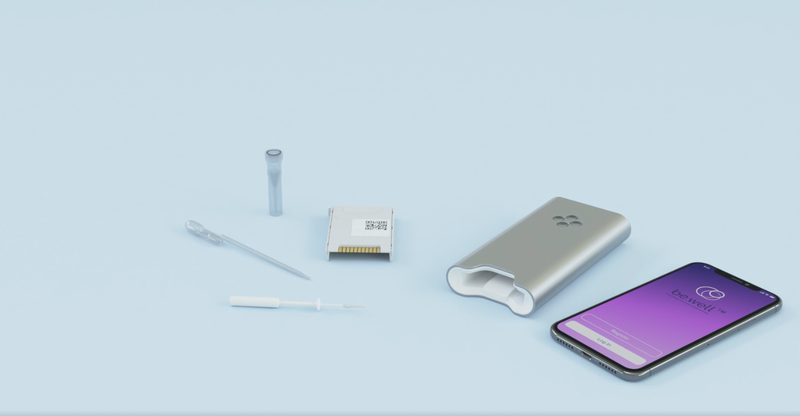The need for accessible healthcare and point-of-care diagnostics became painfully apparent with the onset of COVID-19. Presently coupled with sustainability, lower cost and innovation, solutions within healthcare must meet these higher-than-ever expectations.
Alveo Technologies is re-envisioning the capabilities of molecular diagnostics on its mission to enable earlier detection of pathogens at the point of need. The be.well™ platform may appear palm-sized but it packs a punch by responding to some of the most pressing demands of the healthcare industry.
Sleek and eco-friendly, the be.well™ platform is described as a simple solution that facilitates access to molecular diagnostics. It was recently crowned the winner of the Labpreneur, the first-ever competition of its kind held at Medlab Middle East 2023 that gives medical laboratory start-ups an opportunity to showcase groundbreaking ideas on a global platform.
“Alveo’s leadership team strives to ensure that the planet can leverage the technology we have developed. A molecular-based platform that can test at the point of need is an innovation seemingly from the future. It moves testing away from a centralised lab and the doctor’s office and makes it available over the counter, at home, or even on a farm to test animals and crops. Given that approach, we can make this platform universally accessible, because of the low cost to produce. It is handheld, rugged, and portable and can be taken everywhere. Innovation like this can not only improve healthcare systems but also help to address the impending food crisis and environmental concerns,” explains Shaun Holt, Chairman and Chief Executive Officer of Alveo Technologies.
Circling back to the accessibility of healthcare solutions, the pandemic witnessed the struggle low- and middle-income countries experienced when accessing diagnostic tests. It became evident that the distribution of a solution that is cost-effective while being sustainable was critical.
This generated a need for portable and rechargeable products that can easily be connected to a mobile device or mobile app and display results to make testing a possibility for everyone.
“There is an unmet need for molecular testing at the point of need; there are remote towns all over the world and regions that are hard to reach. For low-income nations, this technology has the potential to make an impact on the lives of their people. It is not just about mass healthcare systems, it is about taking this everywhere, where it is needed the most,” says Holt.

So, how does the technology work?
At present, current testing platforms often require a choice between ease of use, potentially sacrificing accuracy, or expensive medical grade performance, according to Erik Tyrrell-Knott, Chief Business and Strategy Officer at Alveo Technologies.
“What we have refined in the last seven years is LAMP [Loop-mediated isothermal amplification] technology, which is a seismic innovation in Nucleic Acid Amplification Technology (NAAT), and a disruptive offering to say the least given the low cost, yet high accuracy. “We have 29 issued patents worldwide and over 40 pending applications on our approach to LAMP detection that allows us to use a very simple, rechargeable instrument at the point of need,” he says.
When it comes to understanding the technicalities of the be.well™ platform, it boils down to simplifying innovation. Compared to PCR testing, which requires thermal cycling between heat and cold to multiply pathogens, Alveo Technologies’ solution allows the amplification to take place at a constant temperature.
In addition to this, Alveo Technologies’ patented approach to implementing LAMP controls costs and allows for a rugged testing process.
Traditionally, LAMP often requires costly sensors for observation external to the sample well in order to detect the pathogen of interest. This approach requires expensive optics that increase cost and environmental waste.
“Our founder discovered that a positive molecular reaction impedes electrical current. So, instead of requiring expensive optics outside of the well, we have little electrical nodes inside the sample firing every fifteenth of a second. If the pathogen is present, it is going to impede that electrical current from returning a positive result. Also compelling and differentiating is the expansive multiplexing of our test platform. Our cartridge has eight separate sample wells, allowing for the testing of up to seven different samples at the same time, in the same cartridge (i.e., Flu, COVID-19 and RSV). It takes the promise of LAMP and makes it more robust, accessible, less expensive, and environmentally friendly,” explains Tyrrell-Knott.

The be.well platform by Alveo Technologies
Establishing long-term partnerships
In January 2023, Alveo announced the signing of a Memorandum of Understanding (MOU) with the Barbados Investment and Development Corporation (Export Barbados (BIDC)) to co-develop its novel molecular sensing platform, while contributing to the growth of the life sciences industry in the Caribbean nation.
“We want to partner with a wide range of stakeholders such as academics, institutions, investors, industry experts, non-profits, and more, to make the be.well™ platform universally accessible. Our aim is not to fully capitalise on the technology; it really is about bringing partners onto the platform, and enabling true collaboration,” Holt observes.
They are making fast progress expanding their partner ecosystem thanks in part to their recent introduction to the world-renowned Fraunhofer Institute: “We became acquainted with Alveo Technologies at Medlab Middle East 2023. We are impressed with the near-limitless possibilities for their be.well platform and look forward to collaborating to build out their library of tests.
“Diagnostics is one of the four areas of focus for Fraunhofer Health and moving testing closer to patients at the point of need is a strategic imperative for us,” concluded Dr. Dirk Kuhlmeier, the Head of the Diagnostics Department, Fraunhofer Institute of Cell Therapy and Immunology.
____
Back to Technology
_2.jpg?width=100&auto=webp&quality=80&disable=upscale)



_2.jpg?width=400&auto=webp&quality=80&disable=upscale)













.webp?width=700&auto=webp&quality=80&disable=upscale)